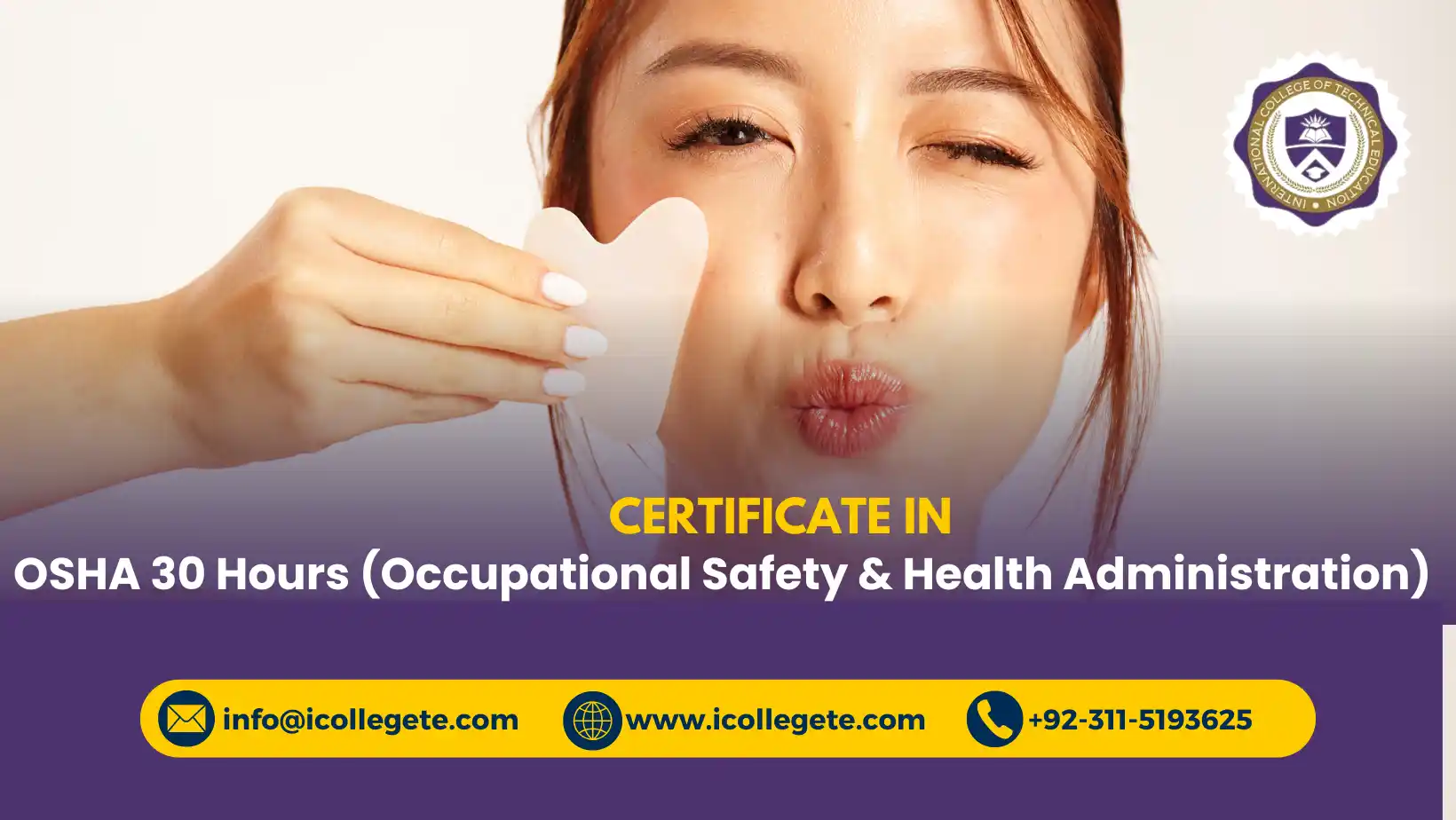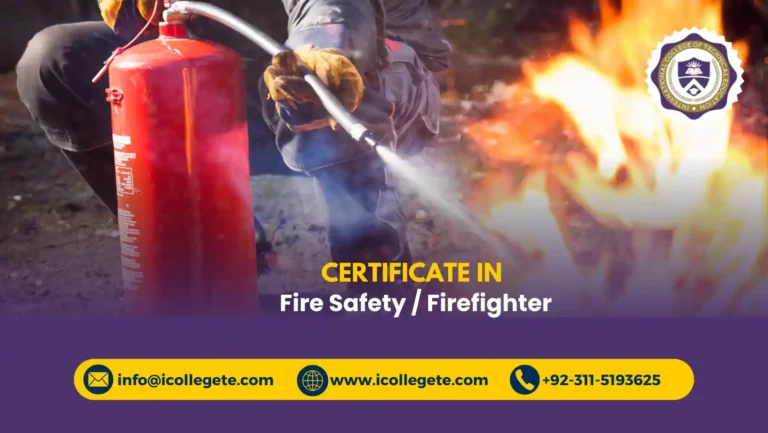The OSHA 30 hours (Occupational Safety & Health Administration course in Jhelum) is a professional competency-based training program designed to provide in-depth knowledge of occupational safety, health standards, and regulatory compliance for workplaces. OSHA 30 hours ( Occupational Safety & Health Administration course in Jhelum focuses on equipping learners with practical skills to identify workplace hazards, implement preventive measures, and promote a safe work environment aligned with international safety standards. Participants will learn to understand employer responsibilities, employee rights, and how to create a safety culture within various industries.
Throughout the OSHA 30 hours (Occupational Safety & Health Administration course in Jhelum), learners engage with safety and health topics related to construction, general industries, emergency response, and hazard prevention techniques. The OSHA 30 hours ( Occupational Safety & Health Administration course in Jhelum includes real-world case studies, best practice insights, and practical scenarios to build confidence in applying safety rules and procedures. Students gain the ability to recognize unsafe conduct, conduct inspections, and respond responsibly during workplace incidents.
OSHA 30 hours ( Occupational Safety & Health Administration course in Jhelum also emphasizes the importance of recordkeeping, reporting, and communicating safety information to relevant stakeholders. Through step-by-step guidance from experienced trainers, learners develop essential safety leadership skills to guide teams in ensuring safe project operations. By the end of the OSHA 30 hours ( Occupational Safety & Health Administration course in Jhelum, learners are well prepared to promote a zero-accident work environment and safeguard lives and property.
Completing the OSHA 30 hours (Occupational Safety & Health Administration course in Jhelum) opens doors to numerous safety-related roles within construction companies, manufacturing plants, energy sectors, hospitals, warehouses, and public organizations, enhancing the employability of individuals committed to occupational safety and health excellence.
Course Overview
- Introduction to workplace safety and OSHA standards
- Understanding rights and responsibilities of employers and employees
- Importance of risk identification and prevention
- Principles of occupational safety management systems
- Process of incident investigation and reporting procedures
- Techniques for inspecting workplaces and identifying hazards
- Basic first aid and emergency response considerations
- Control of chemicals and hazardous substances
- Accident prevention planning in industrial settings
- Job safety analysis and safe work practices
- Fire protection systems and evacuation procedures
- Maintaining workplace hygiene and sanitation policies
- Use of personal protective equipment in varied environments
- Health surveillance and monitoring practices
- Record keeping and documentation for compliance auditors
Course Study Units
- OSHA regulatory framework and safety standards
- Electrical safety hazards and preventive measures
- Fall protection systems and working at heights protocols
- Scaffolding safety awareness and inspection skills
- Fire safety management and emergency action planning
- Hazardous materials handling and storage processes
- Machine guarding and equipment safety techniques
- Health hazards in industrial environments
- Personal protective equipment selection and use
- Excavation and trenching safety requirements
- Ergonomics and manual handling risk reduction
- Confined space entry procedures and monitoring
- Accident reporting and root cause analysis
- Workplace violence prevention strategies
- Safety leadership and communication in teams
Course Learning Outcomes
- Apply OSHA guidelines to maintain safe workplace environments
- Conduct risk assessments and implement corrective actions
- Recognize hazards related to machinery, heights, and chemicals
- Develop emergency plans and evacuation procedures
- Use personal protective equipment effectively and correctly
- Perform accident investigations and prepare safety reports
- Promote safety culture through communication and leadership
- Maintain proper documentation for compliance purposes
- Enforce safe work practices in changing jobsite conditions
- Identify ergonomic risks and minimize musculoskeletal injuries
- Monitor industrial hygiene and environmental factors
- Implement hazard control methods for industrial processes
- Educate peers on occupational safety practices and policies
- Reduce workplace accidents, illness, and downtime
- Assist organizations in meeting local safety legislation
Entry Requirements for This Course
- Minimum Matric/High School education or equivalent
- Ability to read, write, and understand technical English
- Basic knowledge of industrial or construction environments
- Interest in occupational safety and workplace management
- Good communication and teamwork abilities
- Physically fit to work in field and onsite environments
- Submission of admission application form
- Two passport-sized photographs and valid CNIC/B-Form
- Age 18 years or older at time of enrollment
- Willingness to follow safety rules and instructions
- Medical clearance if required by training institute
- Personal commitment to responsible work conduct
- Availability to complete 30 hours of training
- Attendance at orientation and briefing session
- Interview or counseling session based on institute policy
Course Benefits
- Gain internationally recognized occupational safety skills
- Improve employability across multiple industrial sectors
- Acquire leadership abilities in health and safety management
- Understand how to reduce accidents and protect workers
- Develop capability to conduct safety audits and inspections
- Enhance credibility as a trained safety professional
- Learn policies required to comply with safety legislation
- Handle emergency situations confidently and swiftly
- Increase long-term workplace productivity and efficiency
- Build a strong foundation for advanced safety certifications
- Obtain exposure to real-world industry safety practices
- Improve communication and reporting skills for safety roles
- Contribute to safer work environments and community well-being
- Network with professionals for future safety career growth
- Support sustainable work practices across industries
Why Someone Choose This Course
- Rising demand for trained safety professionals in industrial sectors
- Opportunity to ensure safety and health of employees and workplaces
- Obtain practical skills applicable across construction and general industries
- Training aligns with global occupational safety practices
- Opens pathway to safety inspector and safety officer career roles
- Enhances ability to comply with regulatory safety requirements
- Builds confidence to conduct safety checks and implement controls
- Provides a proactive role in protecting human life and property
- Develop knowledge that is essential for leadership responsibilities
- Offers readiness for emergency situations and disaster response
- Builds a foundation for safety career development and progression
- Increases professional value within organizations and projects
- Useful for launching a freelance safety consultation career
- Provides early recognition of jobsite hazards and correction techniques
- Improves overall workplace safety performance
Who Can Enroll in This Course
The OSHA 30 hours (Occupational Safety & Health Administration course in Jhelum) is designed for individuals committed to promoting safe working conditions and advancing their careers in health and safety roles. Fresh school leavers who want to begin their journey in the safety field and diploma holders in technical trades can take OSHA 30 hours ( Occupational Safety & Health Administration course in Jhelum to develop industry-relevant practical knowledge. Those engaged in apprenticeships or job training programs will also find OSHA 30 hours ( Occupational Safety & Health Administration course in Jhelum helpful for enhancing their understanding of safety principles and gaining credentials that improve hiring prospects.
Entry-level professionals currently employed in construction, warehouse operations, energy plants, and factories can upgrade their workplace safety skills through this course. Supervisors, foremen, team leaders, and coordinators who oversee workers and job sites can benefit from the strategic guidance provided, helping them manage safety systems more effectively. OSHA 30 hours ( Occupational Safety & Health Administration course in Jhelum is particularly beneficial to company staff assigned safety responsibilities but lacking formal training credentials in occupational safety and health compliance.
Professionals already working as safety assistants, technicians, safety representatives, or quality control auditors can take the OSHA 30 hours (Occupational Safety & Health Administration course in Jhelum) to advance toward safety officer or safety supervisor roles. Individuals seeking entry into international job markets where OSHA recognition is respected will find the credential valuable for demonstrating serious commitment to safe work practices.
Entrepreneurs, site managers, NGO field workers, and government employees involved in project monitoring and public health initiatives are also suitable candidates for OSHA 30 hours ( Occupational Safety & Health Administration course in Jhelum. Anyone wanting to improve workplace conditions, increase their technical knowledge of hazard prevention, and contribute to community welfare through enhanced safety measures can enroll in the OSHA 30 hours (Occupational Safety & Health Administration course in Jhelum).
Future Progression for This Course
- Safety officer or workplace safety supervisor positions
- Roles in construction site safety management teams
- Employment in manufacturing, oil and gas, and energy sectors
- Opportunities in logistics and warehouse safety departments
- Advancement to senior health and safety management roles
- Entry into safety consultancy and auditing businesses
- Qualification for advanced occupational safety diplomas
- Work with governmental and non-governmental organizations
- Positions in risk assessment and compliance management units
- Industrial hygiene and environmental safety roles
- Training and teaching opportunities in safety institutions
- Participation in international workplace safety projects
- Collaboration with safety equipment companies
- Career in emergency and disaster management operations
- Opportunities to work as freelance safety trainers





